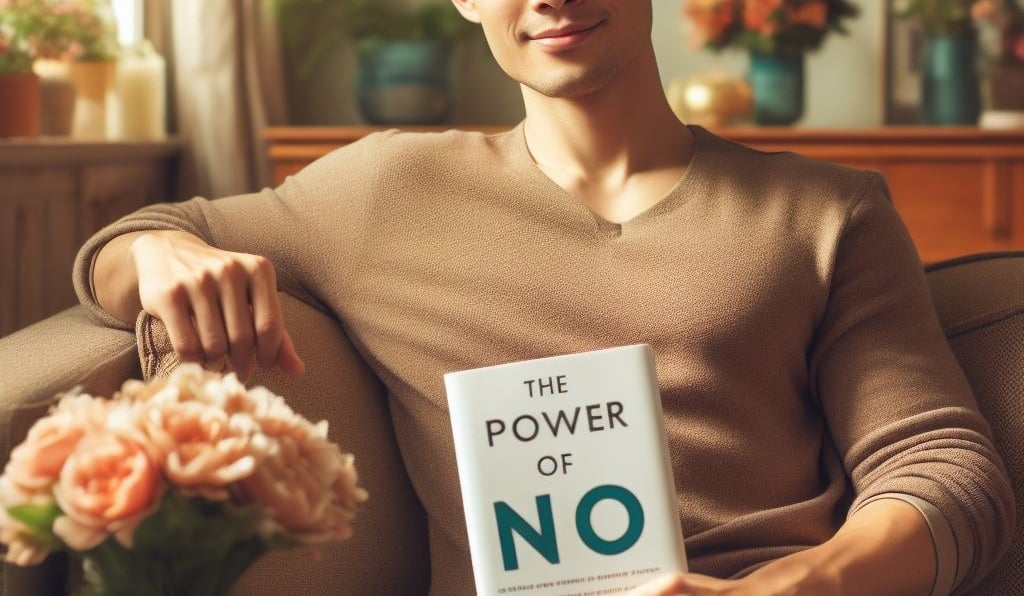The Secret to Saying NO Without Feeling Guilty
Learn how to say no without feeling guilty and reclaim your time and energy.
Isabella Ramirez
8/23/20235 min read


Have you ever found yourself saying “yes” to every request that comes your way, only to feel overwhelmed, stressed, and resentful? If you’re someone who struggles with people-pleasing tendencies, you’re not alone. Learning to say no effectively is a skill that can transform your life, helping you prioritize your well-being, set boundaries, and live a more balanced and fulfilling life. In his insightful book “The Art of Saying No,” bestselling author Damon Zahariades dives into the power of one simple word — “no” — and how harnessing its potential can lead to personal empowerment and healthier relationships.
Why Should You Care?
In a world that often glorifies busyness and endless multitasking, learning to say no becomes essential. Constantly saying yes to others’ demands can leave you with little time for self-care, pursuing your own goals, and nurturing meaningful relationships. The result? Burnout, resentment, and a life that’s not aligned with your true priorities.
“The Art of Saying No” offers a roadmap to a more intentional and fulfilling life. By mastering the art of saying no, you gain the ability to create space for what truly matters to you. It’s not about rejecting people or opportunities; it’s about valuing your time and energy and aligning your actions with your values.
Who’s It For?
This book is a must-read for individuals who struggle with people-pleasing tendencies and find it challenging to set healthy boundaries. If you’re someone who often puts others’ needs before your own, “The Art of Saying No” provides actionable strategies to break free from this cycle. It’s perfect for go-to people and professional doormats who want to learn how to prioritize their lives before other people’s.
What You’ll Learn
Within the pages of “The Art of Saying No,” you’ll discover:
1. The Cost of Being Nice: Explore the hidden costs of constantly saying yes and putting others first, as well as the toll it takes on your well-being.
2. There’s More Than One Way to Say “No”: Learn different ways to decline requests assertively and effectively, without damaging relationships.
3. How Learning to Say “No” Can Lead to Success: Understand how setting boundaries can enhance your productivity, focus, and overall success in both personal and professional endeavors.
Author’s Biography
Damon Zahariades, a self-professed “corporate refugee” and bestselling productivity expert, brings his expertise to “The Art of Saying No.” Based in Southern California, Zahariades is renowned for his self-published productivity and lifestyle management books, including “The Procrastination Cure,” “To-Do List Formula,” “The Art of Saying No,” and “The Mental Toughness Handbook.” He also serves as the showrunner for the productivity blog artofproductivity.com.
The Power of “No”
“No” is a simple word, but its power is immense. In fact, James Clear, the author of “Atomic Habits,” explains that when you say “no,” you’re actually saying “no” to every other option, making it a decision rather than a rejection. Successful people, like Warren Buffett, understand the value of saying “no” to focus on their priorities and avoid spreading themselves thin.
The challenge arises when you find it difficult to say “no” due to a desire to please or fear of disappointing others. However, as Mahatma Gandhi pointed out, a sincere “no” is better than a reluctant “yes” said to avoid trouble. The book delves into the psychology behind assertiveness and teaches you how to decline without feeling guilty.
Why Do We Struggle to Say “No”?
Zahariades explores common reasons for our reluctance to say “no” and provides insights into overcoming them:
1. Avoid Offending People: Fear of offending stems from others’ insecurities, not your refusal. Being respectful in your decline avoids unnecessary offense.
2. Avoid Disappointing People: Recognize that disappointment arises from unmet expectations, not your refusal. You’re not responsible for others’ unrealistic hopes.
3. Avoid Seeming Selfish: Prioritizing your needs isn’t selfish; it’s necessary for your well-being. Balancing your time benefits both you and those you care about.
4. Yearning to Help Others: Helping others is noble, but you can’t solve everyone’s problems. Prioritize self-care without compromising your desire to assist.
5. Low Self-Esteem: Saying “no” improves self-worth. By declining when necessary, you signal that your time is valuable and worthy of respect.
Strategies for Saying No Effectively
To help you navigate the art of saying “no,” Zahariades presents actionable strategies:
1. Be Direct and Straightforward: Clearly decline requests with honesty and a concise reason. Clarity leaves no room for confusion.
2. Don’t Stall for Time: Avoid hesitation; a direct “no” shows respect and avoids prolonging the situation. Prompt responses are courteous.
3. Replace “No” with Another Word: If “no” feels too abrupt, offer a clear explanation. Choose a word or phrase that conveys your inability while respecting the requester.
4. Resist Offering Excuses: Clear reasons are different from excuses. Excuses weaken your decline and may lead to further negotiation. Honesty is the best policy.
5. Take Ownership of Your Decision: When declining without a valid excuse, use phrases like “I would prefer not to.” This communicates your needs, not your abilities.
5 More Strategies for Saying No (Without Feeling Guilty)
Continuing on your journey toward assertiveness, consider these additional strategies:
Be Sincere in Your Response: Be genuine and straightforward when declining. Authenticity earns respect and maintains honesty.
Use Humor to Lighten the Mood: Infuse humor to ease tension and create a more lighthearted atmosphere during difficult conversations.
Practice the “Positive No”: Acknowledge the request, express gratitude, and politely explain your inability. Maintain respect while setting boundaries.
Prioritize Your Well-Being: Putting yourself first is not selfish. By caring for yourself, you become better equipped to care for others.
Reflect and Learn: Evaluate your experiences with saying no. Celebrate successes and learn from situations where you could have been more assertive.
The Roadmap
Damon Zahariades’ “The Art of Saying No” is a valuable guide for breaking free from the cycle of people-pleasing. With practical strategies, relatable anecdotes, and actionable steps, the book provides a roadmap for asserting yourself while maintaining positive relationships. Zahariades’ writing style is engaging and empathetic, making the book accessible and relatable.
Zahariades skillfully guides readers through various strategies to assertively decline requests, empowering them to prioritize their needs while preserving relationships.
In conclusion, “The Art of Saying No” is a tool for personal empowerment and healthier relationships. By mastering the art of saying no, you can create a life aligned with your values, nurture your well-being, and achieve balance in your commitments.
Get the Book
Get your copy today and unlock the art of living well through effective communication and assertive decision-making. Get the book on Amazon.
Saying no is a path to personal growth and empowerment. By incorporating the principles from “The Art of Saying No,” you can embark on a journey toward a more intentional and fulfilling life. Remember, saying no is not about closing doors; it’s about opening the door to a life that aligns with your true priorities and values. Through the art of saying no, you can master assertiveness, honor your commitments, and embrace the art of living well.

Empowering women to be healthy, happy, and beautiful.
Affiliate Disclosure: Some of the links on this site are affiliate links, which means that we may receive a small commission if you make a purchase through them. This is at no extra cost to you. This helps support this website and allows us to continue to create content like this.
©2026 FemmeJourney. All rights reserved.


